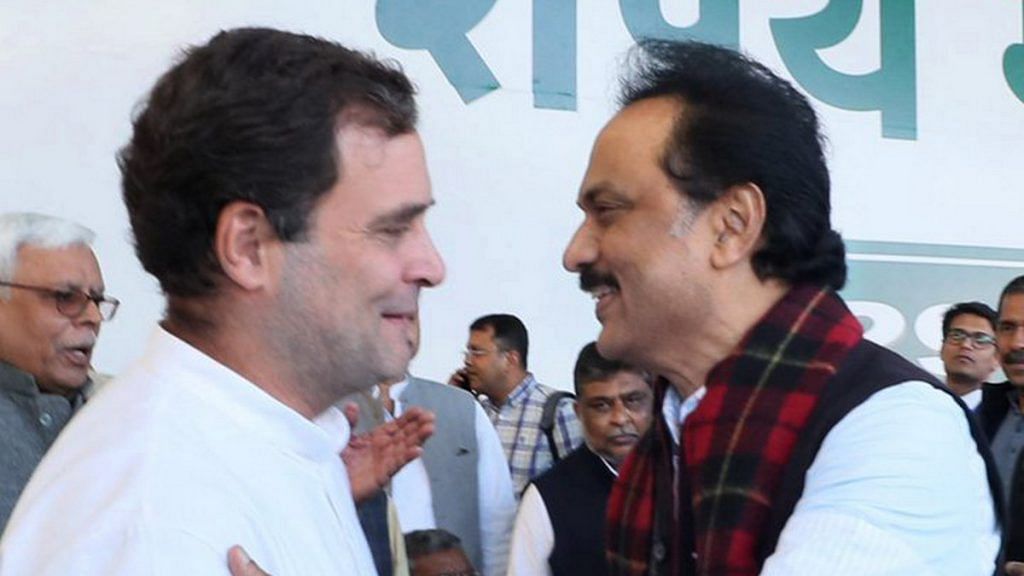Chennai: The alliance between the Dravida Munnetra Kazhagam (DMK) and the Congress appears to be on the rocks, and the regional party is showing no signs of backing down, putting a question-mark on how long the tie-up will last.
It all started with Tamil Nadu Congress chief K.S. Alagiri publicly accusing DMK president M.K. Stalin of “not adhering to coalition dharma” by not giving his party enough seats in local body polls. The DMK then skipped the Congress-led opposition party meet, held Monday to discuss the political situation following nationwide protests against the Citizenship (Amendment) Act.
A day later, DMK Lok Sabha MP T.R. Baalu stated that his party had skipped the meet due to Alagiri’s statement, and remained non-committal about normalising ties between the parties.
“We did not take part in the meeting since our chief was accused of violating coalition dharma,” Baalu was quoted as saying by news agency PTI.
After Alagiri expressed regret and met Congress interim president Sonia Gandhi on the issue, Baalu was asked if that signalled a returned to the old status. “Time will tell whether it has returned to the old status or not. Why are you concerned?” Baalu said.
Also read: Tamil Nadu deputy CM Panneerselvam, DMK chief Stalin lose central security cover
Alagiri’s statement
The trouble in the alliance has been brewing for a while. When senior Congress leader and former Union minister P. Chidambaram was arrested last year, there was little outcry from the DMK, which upset the Congress.
Then, on 10 January, Alagiri issued a statement, accusing DMK chief Stalin of not providing the Congress enough seats in local body elections, and of promoting cross-voting.
“Of the 27 district panchayat chief posts, not even one has been given to us. In the case of 303 panchayat unions, only two have been allotted to us. Even those allotted to us by the DMK leadership were not honoured by the district units,” Alagiri had stated.
However, Chidambaram was quick to play down Alagiri’s words, saying they were the feelings of party workers, and not directed against the DMK.
So, when the Congress convened the meeting of opposition parties, it did not come as much of a surprise that the DMK joined others like the Trinamool Congress, Aam Aadmi Party, as well as Congress’ Maharashtra ally Shiv Sena in skipping the meet. The DMK is the third-largest party in the Lok Sabha with 24 members.
Also read: Anti-CAA ‘kolam’ outside DMK chief MK Stalin’s house day after 8 detained for the same
Bubbling discontent
Senior Congress leader and party’s parliamentary whip Manickam Tagore called the DMK’s move to skip the meeting “quite an extreme reaction”.
On the local body elections issue, Tagore added: “DMK is not very accommodative of us. Even if they don’t give us in abundance, they should give at least something.”
E.R. Eswaran, president of the Kongunadu Makkal Desia Katchi, another member of the DMK-Congress alliance which has one Lok Sabha MP, also took a shot at the Congress, but denied that this would be a long-lasting issue.
“There is no problem in the alliance. There will be such problems in local body elections. The Congress party need not have made it appear big. Even they (Congress) did not lend any support at many places,” Eswaran said.
Stalin’s calculation
The DMK and the Congress had been allies for 10 years under the UPA umbrella between 2004 and 2014. However, the parties went through a bitter phase after Manmohan Singh’s UPA-2 government suffered a defeat in the 2014 Lok Sabha elections.
Around this time, current party chief Stalin was trying to prove his worth as the heir to father M. Karunanidhi.
Speaking about this era, political analyst Ravindran Duraisamy told ThePrint: “In 2014, the Congress was willing to work out an alliance with the DMK, and even Karunanidhi was okay with it. It was only Stalin who adamantly rejected the proposal. He felt that an alliance would enhance the positions of those who were already MPs, especially (half-sister) Kanimozhi.
“Then, in the 2016 state assembly elections, when the parties came together, they lost badly. The DMK bought the narrative that it was the Congress that pulled it down.”
The DMK won its first election under Stalin’s leadership in 2019 when its alliance with the Congress and smaller parties almost swept Tamil Nadu. “While Stalin thinks it is only his leadership that led the alliance to the sweep, state Congress leaders attribute the victory to Rahul Gandhi’s leadership,” Duraisamy said.
“Sensing that all this will now lead to Congress asking for seat-sharing and power-sharing in the state in the 2021 state assembly elections, DMK wants to marginalise the Congress,” he said.
Also read: Prashant Kishor’s latest assignment — helping DMK win 2021 Tamil Nadu assembly polls
